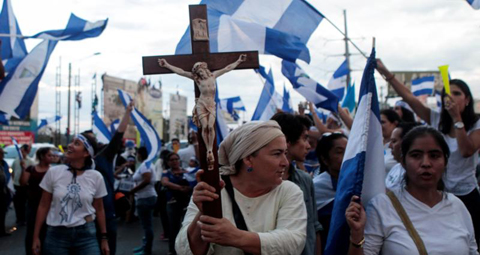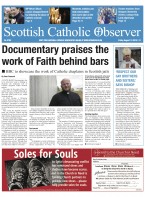BY Peter Diamond | July 27 | ![]() 0 COMMENTS
0 COMMENTS ![]() print
print

Scots Catholics increasingly concerned about persecution and human rights in Nicaragua
Catholic laity and charities condemn violence in Nicaragua as death toll surpasses 300
A retired doctor from Dumbarton who worked in Nicaragua with a Catholic agency has condemned violence in the country that has seen more than 300 people killed.
Edward Coyle first travelled to Nicaragua in 1983 with the Catholic Institute for International Relations (CIIR) and spent two years working and developing medical clinics and small hospitals.
Following his retirement in 2015 from director of public health NHS Fife, Mr Coyle visited the Central American country in May this year to see a friend and former colleagues regarding future public health projects.
However, on-going barbaric treatment of student protestors by the Nicaraguan government following a dispute over pension reforms, have crippled chances of any immediate public health projects Mr Coyle and his former CIIR colleagues had intended.
Mr Coyle said: “Any future projects have been put on hold because of the violence, as it’s too dangerous.
“I was cautious about going out due to the pensions dispute protests but things appeared to have calmed down on the week leading up to my trip.
“However, the trip itself was an eye-opener to the utterly shocking treatment of the Nicaraguan people.
“Myself and my former colleagues were walking down the main thoroughfare of Managua on an afternoon and in the distance were what looked like a lot of ambulances—unfortunately they turned out to be police vans and they were driving towards us.
“It was very frightening as they were trying to clear the streets and were firing their shotguns so we had to take cover in a nearby business.
“Two days later I witnessed some of the worst violence of the conflict since it started in April on Mother’s day, Wednesday May 30.
“I was on my way to see a famous Nicaraguan singer at a concert when my friend and I were caught up in the end of the demonstration, which we passed en route.
“The police and irregulars were shooting indiscriminately at the protestors and I saw one critically injured person carried into the back of a van and driven away, hopefully to a hospital.
“It was an utterly shocking experience and it was reported the next day that 15 people were killed and over 200 injured.”
A Human Rights report by the Organisation of American States HR Commission published last month revealed that injured protestors were being denied medical treatment at Nicaraguan public hospitals.
Mr Coyle added: “The Human Rights report backed up what we were hearing. The situation over there is very bleak indeed and it needs to be tackled.”
Mr Coyle, originally from Dumbarton, praised the steadfast work of the Catholic Church in Nicaragua. He said: “The role of the Catholic Church is extremely important if there is to be an end to the conflict. Cardinal [Leopoldo José] Brenes appears to be one of the few people who can take President Ortega to the table for negotiations and has called him out time after time.
“He could have easily taken a bullet when showing solidarity with protestors and has very much played the role of the good shepherd and has sought further support from the Church around the world.”
This week, two Catholic charities also condemned the violence directed towards Nicaraguan student protestors by the Ortega government.
Alistair Dutton, director of SCIAF, said: “SCIAF stand shoulder-to-shoulder in solidarity with the people of Nicaragua.
“We have been working with poor communities in the country for over 30 years through local partners, supporting children with disabilities, helping families to grow more food and earn an income, and providing vocational training for young people.
“Often at great personal risk, the Catholic Bishops Conference in Nicaragua has led calls on the government to end the repression and violence.
“We urge the Nicaraguan government to respect the right to peaceful demonstration, and all sides to immediately stop all acts of violence.
“We join in prayer with the people and Church of Nicaragua, asking for calm, peace, security, and justice in the country, so that the people can finally enjoy a life free of repression, in dignity, peace, and harmony.”
On Monday July 23, President Ortega conducted a rare interview with American news outlet Fox TV in which he rejected claims that Catholic clergy had been attacked.
Dr John Newton from pontifical charity Aid to the Church in Need, said: “It is absolutely scandalous that President Ortega can appear on TV and reject reports that priests have been attacked.
“As Cardinal Brenes made very clear when he spoke to Aid to the Church in Need, a number of priests have been assaulted by members of pro-government militias. When the Basilica of San Sebastian in Diriamba was attacked Cardinal Brenes was himself assaulted along with two other bishops. Such violent raids on places of worship are utterly unacceptable.
“The Church has opened its doors to help those wounded during protests, and also offered sanctuary to protestors seeking safety from the violence meted out by pro-government forces. But this is why it has come under attack, the Church is seen by Ortega’s supporters as having sided with the opposition, when it is only trying to help and protect people.
“Aid to the Church in Need has a number of projects in Nicaragua—and last week announced that we will be carrying out a project trip to the country in the near future, both as a gesture of solidarity with the Church there and to explore ways that we might be able to provide them with pastoral support.”











